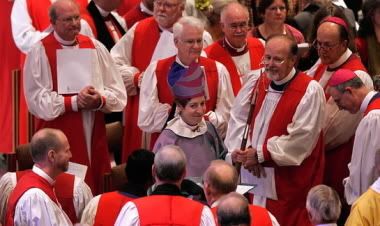
The House of Bishops of the Episcopal Church is meeting this week and next. They have been urged to reconcile with the Anglican Communion or say clearly that they cannot, and "The Primates request that the answer of the House of Bishops is conveyed to the Primates by the Presiding Bishop by 30th September 2007," according to their communiqué from Dar es Salaam. Someone asked me this week what should happen went the bishops meet. Here is my answer:
I believe that the House of Bishops should exercise leadership to begin to heal the schism and restore faith and trust among the member churches of the Anglican Communion. The Primates communiqué at Dar es Salaam indicated: “17. At the heart of our tensions is the belief that The Episcopal Church has departed from the standard of teaching on human sexuality accepted by the Communion in the 1998 Lambeth Resolution 1.10 by consenting to the episcopal election of a candidate living in a committed same-sex relationship, and by permitting Rites of Blessing for same-sex unions.”
The House of Bishops should respond by completing those actions asked of it by the wider Communion: 1) express the Episcopal Church’s regret that the proper constraints of the bonds of affection were breached in the events surrounding the election and consecration of a bishop for the See of New Hampshire, and for the consequences which followed, 2) effect a moratorium on the election and consent to the consecration of any candidate to the episcopate who is living in a same gender union until some new consensus in the Anglican Communion emerges, and 3) halt all litigation against current and former Episcopal parishes over property and cooperate for a “a robust scheme of pastoral oversight to provide individuals and congregations alienated from The Episcopal Church with adequate space to flourish within the life of that church in the period leading up to the conclusion of the Covenant Process.”
It would also be an enormous gesture of reconciliation for the House of Bishops to reaffirm the teaching on human sexuality as it was stated in 1998 Lambeth Resolution 1.10. Likewise, it would be an enormous gesture of reconciliation for the Bishop of New Hampshire to choose to either live a chaste life or resign his see.
That is what should happen. However, I fear that none of the above will take place, and that as a result, both the Episcopal Church and the wider Communion will continue to disintegrate. I do not believe that is the will of God.


6 comments:
so , would that just be the male bishops then or do the women actually get a say?
Yes, the women get to vote too. Get a clue; this ain't the 19th Century.
Hmm, they've kinda already done 1, have almost certainly already done 2, and doing 3 without the parishes dropping their claims to the buildings could establish something of a legal precident and make it harder for dioceses to hold on to property in the future.
Affirming Lambeth I.10 wouldn't be that good as a gesture of reconciliation becuase, while it would make those on the conservative end of things happier, it would piss off those on the liberal end of things and (more importantly) suggest that there is no legitimate debate on the questions of homosexuality with which TEC and the Communion are currently wrestling. Similarly, having Bishop Robinson step down or put away his partner would also be viewed more as a conservative victory than a forward looking compromise, and the winner take all atmosphere is part of the problem in TEC and the Communion today.
Jon
Looks like you have a troll, Father. Apparently some A Nonny Mouse needs some cheese to go with his whine. :D
Jon,
I would say you are right about #1, that seems accepted. Although I am discouraged that the regret is less with our actions than with the offense felt by others. #2 is where it is very fuzzy and the church needs to be clear about it. Since the last General Convention, various bishops and councils have certainly been clear that they will not be obligated to even the fuzzy limitations of B033, so I don't see any reversal of momentum there. You could say that #3 naturally follows out of 1 and 2, so the highly litigious atmosphere at the moment is not unexpected.
As long as less than half of the diocesan bishops refuse to be bound by B033 the minority can posture all it wants without altering the outcome of the consent process, and at the moment it is rather clear that partnered glbt priests are ruled out by B033.
Jon
Post a Comment